When it comes to worming livestock, there are many different ways to do it. Some people choose to use chemical-based wormers, while others choose to use natural methods.
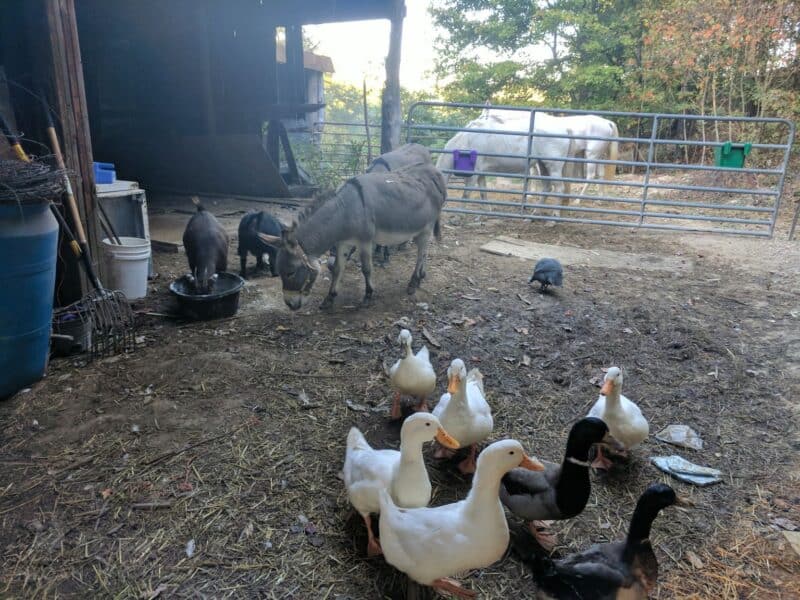
In the old days, there were only a few ways to worm livestock, and most of them involved using chemicals.
However, there are several natural methods that can be used to worm livestock safely and effectively.
These “old-fashioned” methods may not be your only way to do it now, but they might be a good alternative or addition to your current deworming regimen.
Have you ever wondered how they did something back in the old days? You know, back when there wasn’t a store to go to for your every need.
I’ve often wondered how farmers did lots of things without modern conveniences. In particular, I’ve wondered how they took care of the health of their livestock back in the pioneer days.
In this blog post, we will discuss some of the old-fashioned methods for worming livestock that involve using chemicals, as well as some of the newer natural methods that can be used today.
We will also discuss the benefits and drawbacks of each method so that you can decide which one is right for you. So let’s get started!
Table of Contents:
Worming Livestock in the Old Fashioned Sense
Worms are a constant problem for livestock farmers. Not only do they cause animals to become ill, but they can also lead to decreased productivity and even death.
In the past, worming was done by hand, using a simple hook to remove the worms from the animal’s digestive tract. However, this process was time-consuming and often ineffective.
Today, there are many different worming products available that can be used to control worm populations.
When choosing a wormer, it is important to consider the type of livestock being treated, as well as the age and health of the animals.
Some products are suitable for use on all types of animals, while others are specific to certain species.
In addition, some products can only be used on young animals, while others are intended for adult animals.
With so many options available, it is important to consult with a veterinarian or other expert before choosing a wormer.
By taking these factors into account, farmers can select the best product for their needs and help to keep their livestock healthy and productive.
What Are the Benefits of Worming Livestock in an Old Fashioned Sense?
For those who have livestock, worming them is an essential part of keeping them healthy and free from parasites.
However, there are a number of ways to worm livestock, and not all of them require the use of store-bought chemicals.
For example, a common “traditional” method to worm livestock is to use herbs. There are a number of herbs that can be used for this purpose, including wormwood, tansy, and garlic.
These herbs can either be fed to the livestock or used to make tea that can be added to their water.
Not only are these methods more natural, but they can also be more effective than some of the chemical wormers on the market.
As a result, it is worth considering these more old-fashioned methods next time your livestock need to be wormed.
What is the Best Way to Worm Your Livestock – By Using Natural or Chemical Methods?
The two most common methods of deworming are chemical wormers and natural wormers.
While chemical wormers are generally more effective, they can also be more expensive. In addition, some animals may have an adverse reaction to the chemicals in the wormer.
Parasites can develop a resistance to the chemical over time, too, meaning more product will be necessary to have an impact- or you may have to switch medications entirely.
Of course, chemicals aren’t always the best for us, either, and they can make their way into our food system when used on animals.
Natural wormers, on the other hand, are generally less expensive and are considered to be much safer for animals (and us!).
However, they may not be as effective as chemical wormers and may need to be used more often. Ultimately, the best way to worm your livestock will depend on your individual situation.
General Tips for Worming Livestock
When it comes to worming livestock, there are a few general tips that can help to make the process go more smoothly.
First, it’s important to choose the right wormer for your animals. There are many different products on the market (and old-fashioned methods you can choose from!), and not all of them are effective against all types of worms.
It’s important to follow the manufacturer’s instructions carefully, if you’re using a chemical product. This will help to ensure that the wormer is used correctly and that the animals receive the full dose.
Finally, it’s important to keep an eye on your animals after they’ve been wormed.
In some cases, animals may experience side effects such as diarrhea or vomiting. If this occurs, it’s important to seek veterinary advice immediately.
By following these simple tips, you can help to ensure that your animals stay healthy and worm-free.
How to Tell if Your Livestock Needs to Be Wormed – Signs of Worms in Animals
As any livestock owner knows, worms can be a serious problem for animals. Not only do they cause discomfort and weight loss, but they can also lead to more serious health problems.
Fortunately, there are a few telltale signs that can help you determine if your livestock need to be wormed.
One of the most common signs of worms is a loss of appetite. If your animals are not eating as much as usual, it may be a sign that they are infected with worms.
Another common symptom is diarrhea. This is caused by the worms robbing the animal of nutrients, leading to weight loss and weakness.
In severe cases, anemia can also occur. This is a dangerous condition that can be fatal if left untreated.
Modern Livestock Worming Methods
Today, there are a number of safe and effective methods for controlling worms in livestock.
One such method is the use of anthelmintics, which are drugs that kill or disable parasites without causing harm to the host animal.
Another promising method of control is through the use of vaccines, which help the animal to build immunity to specific parasites.
With continued research, it is likely that even better methods of controlling livestock parasites will be developed in the future.
Natural Worming Livestock Methods: A Breakdown By Species
Worming livestock used to be a daunting and time-consuming task. Farmers had to sort through their animals one by one, looking for signs of worms.
Then, they had to administer the appropriate treatment, often using a trial and error approach. Thankfully, modern worming products have made the process much simpler.
However, these techniques and methods can be helpful in our modern day and age.
Goats
There are a variety of old-fashioned methods for worming goats, many of which are still in use today.
One popular method is to feed the goats garlic, as the strong smell is thought to repel worms.
The jury is out on whether this is effective – more about this when I discuss sheep dewormers.
Another common approach is to add certain herbs to the goat’s food, such as wormwood or rue.
Some goat owners also swear by regular doses of castor oil, which is thought to help expel worms from the intestinal tract.
In addition, many farmers believe that giving goats plenty of access to fresh, clean water helps to keep them healthy and free from worm infections.
Copasure boluses are also thought to be effective in controlling the barber pole worm in goats and sheep, but copper boluses can be dangerous surround sheep (they can’t handle high volumes of copper).
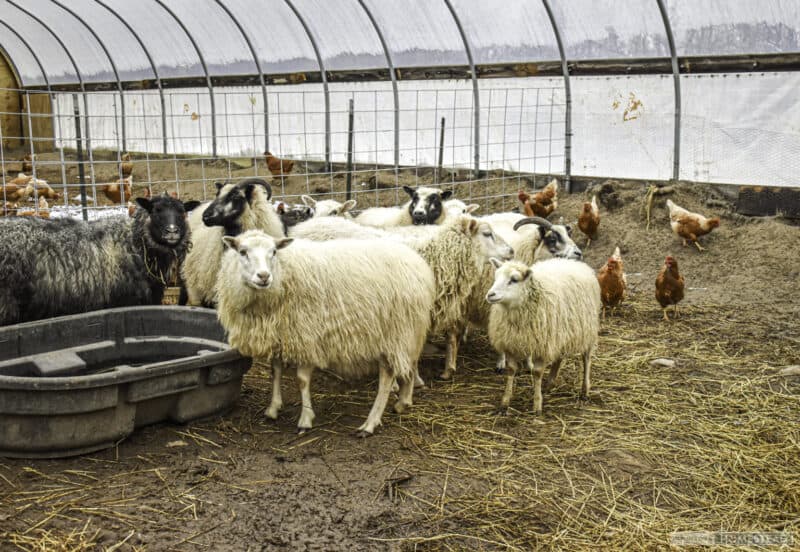
Sheep
Sheep are most commonly affected by roundworms and flukes. Like cattle, roundworms can cause a variety of health problems in sheep, including diarrhea, weight loss, and anemia.
Flukes are less common in sheep than in cattle, but they can still cause liver damage if not treated promptly.
In the past, farmers used a variety of methods to worm their sheep, many of which are no longer considered effective.
One popular method was to feed the sheep large quantities of garlic, which was thought to kill the worms. However, recent studies have shown that garlic is not an effective worming agent.
Another old-fashioned method was to let the sheep graze in areas that had been recently treated with insecticides or herbicides.
However, this approach is now known to be harmful to the sheep, and can lead to a number of health problems.
On my farm, I use a combination of products to keep my sheep healthy. One involves a mixture of garlic, apple cider vinegar, molasses, and B12 supplement.
The apple cider vinegar and garlic promote good intestinal, digestive, and immune health, while the B12 and molasses give the sheep a boost of nutrients.
Occasionally I also supplement with a drench of chemical dewormer, but this solution, what I call my “Bloody Mary Go Go Juice,” tends to be highly effective!
Cows
Farmers who keep cattle should be familiar with the three main types of worms that affect this species: roundworms, tapeworms, and flukes.
Roundworms are the most common type of worm found in cattle, and they can cause a variety of health problems, including diarrhea, weight loss, and anemia.
Tapeworms are less common, but they can also cause serious health problems if left untreated. Flukes are rare in cattle, but they can cause liver damage if not treated promptly.
While there are now many effective chemical wormers on the market, some old-fashioned methods can still be useful in controlling worm populations. One such method is rotational grazing.
By moving cattle to fresh pasture regularly, farmers can help to break the worm life cycle and reduce the number of worms that cattle are exposed to.
Another effective method is pasture management.
Careful selection of grasses and legumes can create a more diverse and productive pasture that is less conducive to worm growth.
Shaklee Basic H (along with another product, Native Lick) is another common old-fashioned treatment for worms in cows, though it can be hard to find.
Some old farmers I know even use a scoop of tobacco to kill worms in cows!
Chickens
Chickens are susceptible to a number of different types of worms, including roundworms, tapeworms, and lungworms.
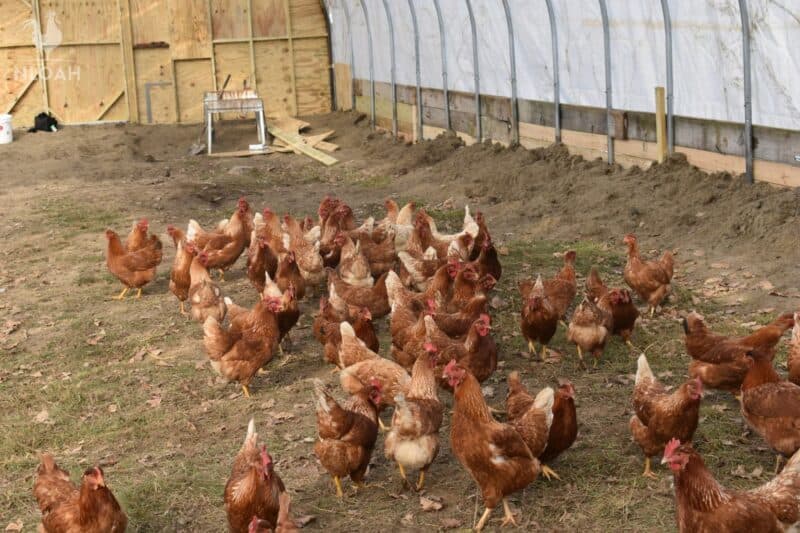
While there are a number of effective medications available to treat these parasites, some chicken keepers prefer to use more natural methods.
One popular method is to feed the chickens crushed garlic cloves, which can help to kill the worms and boost the immune system.
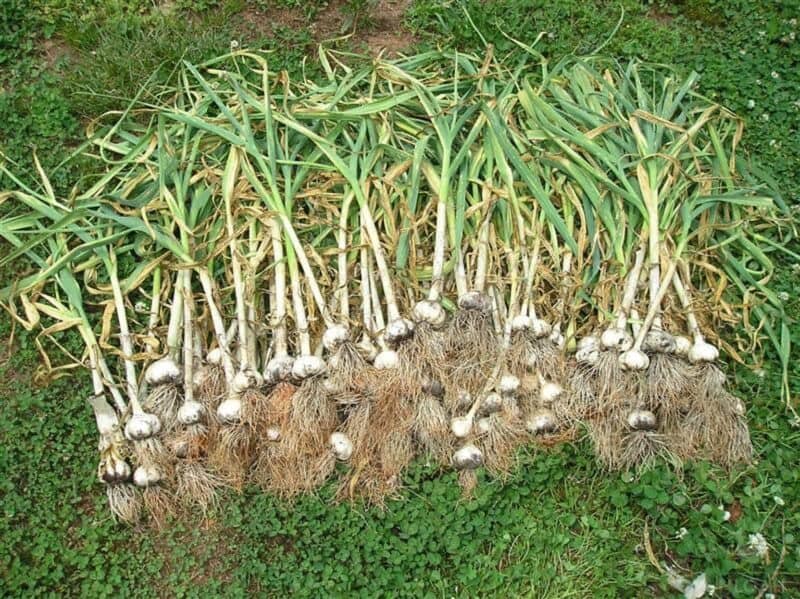
Another common remedy is to add a small amount of apple cider vinegar to the water supply, as the acidity can help to kill the worms.
Some chicken keepers also swear by using raw pumpkin seeds, as the worm larvae are attracted to the seeds and can be easily ingested.
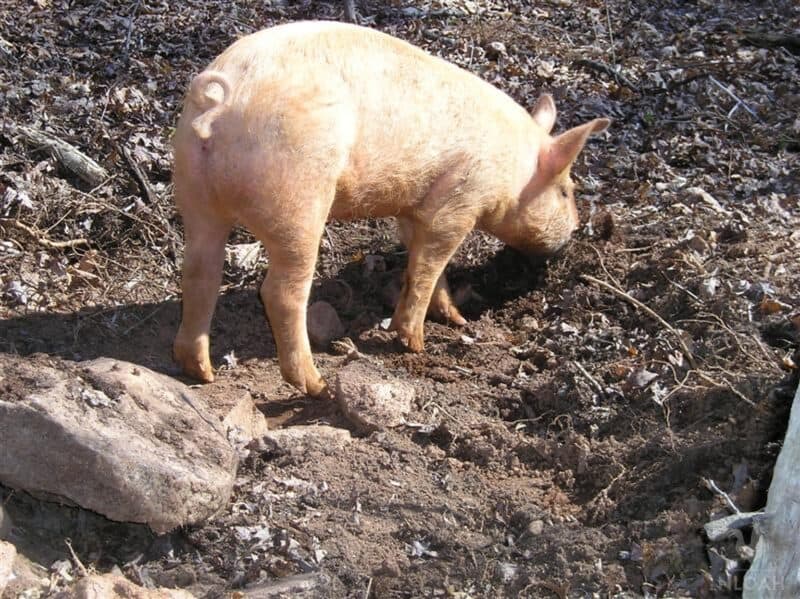
Pigs
I know it sounds crazy, but I have talked to people who are still using lye to worm their pigs to this day.
In particular I’ve been told that a tablespoon of lye in a 5 gallon bucket of slop is enough to worm a full-grown pig. Just make sure to supply plenty of water.
I asked if the pig seems to be in pain or anything from the lye, and the answer has always been “no”. Just don’t overdo it, or it could cost you the life of your animal.
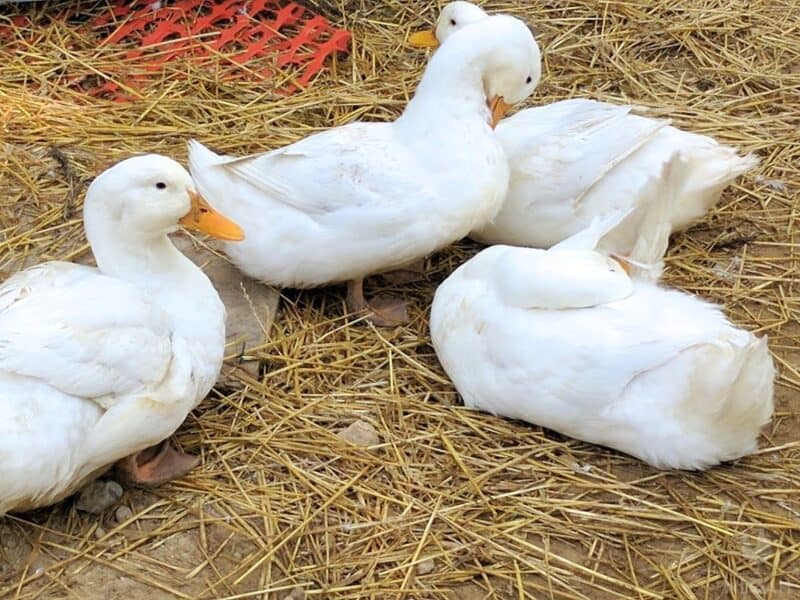
Ducks
Ducks are similar to chickens in that they can be dewormed with natural remedies like garlic and apple cider vinegar, along with raw pumpkin seeds.
Another common treatment for duck worms is to dust the duck’s food with diatomaceous earth.
This substance is made from the fossilized remains of algae and is sharp-edged, which can help to damage the worms’ exoskeletons.
Feeding your ducks tannin-rich plants may also help. Examples include sainfon, birdsfoot trefoil, and chicory.
Horses
Though there are many modern worming products available for horses, some horse owners still prefer to use old-fashioned methods.
One popular method is to feed the horse garlic, which is thought to help expel worms.
Others add herbs such as mint, rosemary, or fennel to the horse’s feed, which is also believed to have worming properties.
Still, others choose to worm their horses with food-grade DE (diatomaceous earth) because it’s a completely natural product that’s effective in killing a wide range of parasites.
Final Thoughts
Although we no longer have to worry about parasites in our livestock if we are using modern medicines, it is worth considering the methods used in the old days.
Parasites can wreak havoc on an animal’s health, and modern medicine has done wonders in helping us keep them at bay.
However, there are still some who swear by traditional methods of parasite control, such as worming livestock.
If you are curious about these methods or are struggling with parasitic infection in your animals, please consult your veterinarian.
They will be able to help you determine the best course of action for keeping your livestock healthy and free from parasites.
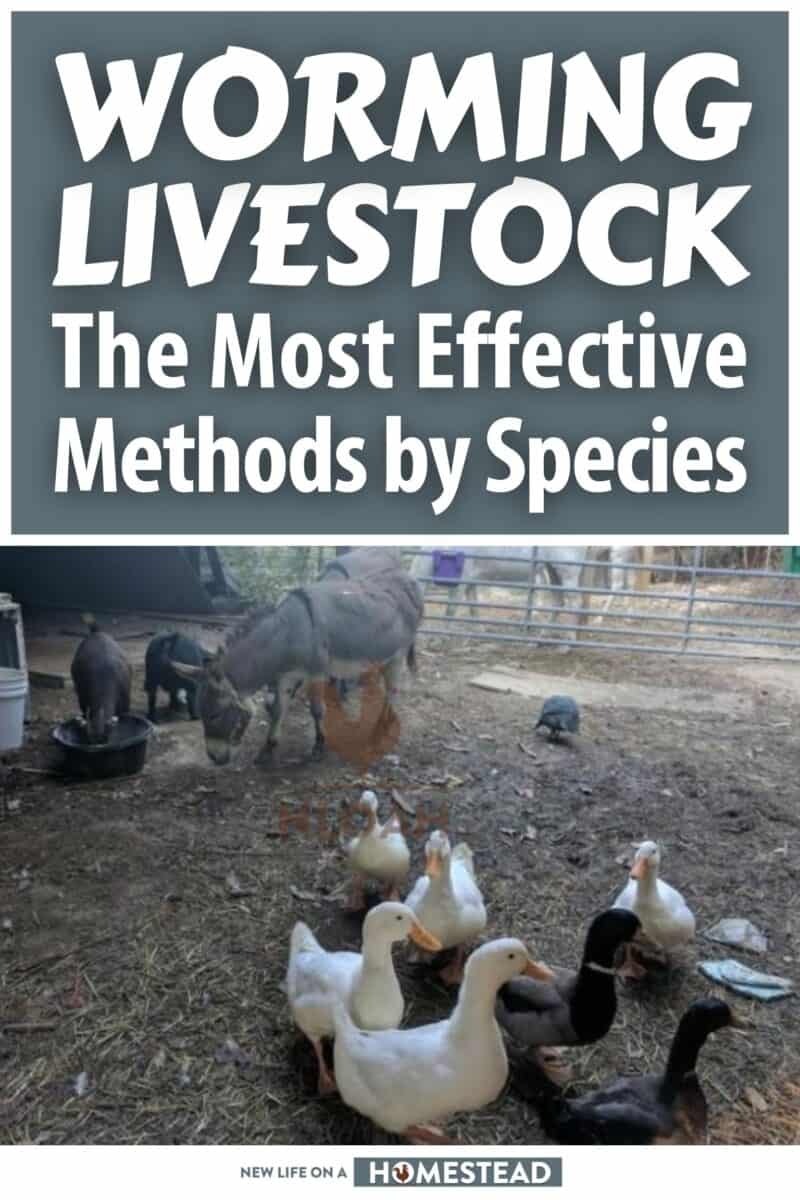

Rebekah is a high-school English teacher n New York, where she lives on a 22 acre homestead. She raises and grows chickens, bees, and veggies such as zucchini (among other things).
